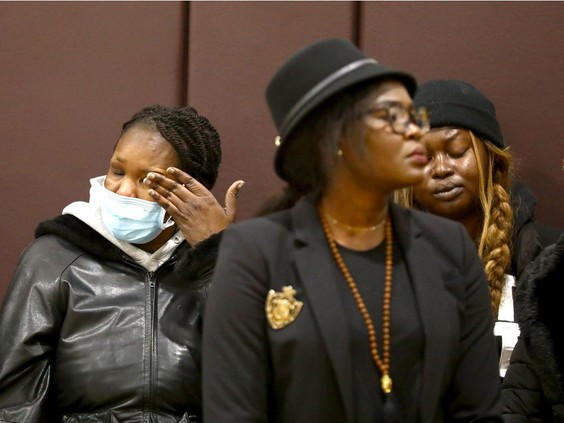Canadian Police Kill Latjor Tuel, Abandon Body, Call Ambulance For His Dog
Loved ones of Black man killed by Calgary officer refute police claims
‘This is a serious issue. Systemic racism is rife and alive in our society’
Family and friends of a Black man killed by Calgary police are raising questions about the official accounts of his death.
Calgary police fatally shot Latjor Tuel on Saturday after he allegedly attacked a police service dog while officers attempted to apprehend him near a bus stop on 17th Avenue S.E. in Forest Lawn. Video of the incident, which Postmedia has chosen not to publish due to its graphic nature, shows an officer fire four shots as Tuel struggles with the dog. Tuel died of his wounds on scene.
“How dehumanizing that be? (It tells you) they value the life of the police dog more than the Black man,” said Charles Odame-Ankrah, a friend of Tuel’s and one of several speakers at a Monday media availability put on by the Calgary African Community Collective.
“This is a serious issue. Systemic racism is rife and alive in our society.”
Tuel, a South Sudanese refugee who had lived in Calgary for roughly 20 years, was described by family and friends at the event as having suffered from severe post-traumatic stress disorder related to his time as a child soldier in his home country. He had long been financially supporting family members who still live in South Sudan.
Several speakers refuted the police version of events, saying Tuel was “simply waiting for the bus” and the item police called a weapon was a retractable cane he used to help him walk due to issues with his knee. His reaction in hitting the dog, they said, was in self-defence and didn’t warrant his death.
“I want to ask all of you here; (would you) stay and put your hands in your pockets when somebody’s unleashed a K-9 dog on you?” said Odame-Ankrah. “Naturally, you go into defence. It’s a natural human reaction.”
Loved ones reiterated Tuel’s struggles with his mental health, referencing his PTSD and struggles in recent days. Regardless of his mental state, they say police had other options that wouldn’t have resulted in Tuel’s death. Police efforts to resolve the situation without violence were not enough, they said.
“The important thing that could have been done differently by the (police) would be to help him rather than to shoot and kill,” said Nhial Wicleek, a longtime friend of Tuel’s.
Lina Atak, an advocate for the Sudanese community who witnessed the altercation, said the information released by police and amplified by local media has vilified Tuel, painting him as an unstable criminal.
“What I would like to correct is the message that has been put out there to demonize our brother, to criminalize him as a bad person,” she said.
“Our brother was not a criminal and he was not a danger to society. He was not a danger to the community . . . He was simply a Calgarian enjoying a meal as he waited for the bus.”
In a Saturday evening news release, the Calgary Police Service said officers were called around 3:40 p.m. for reports of a man in possession of weapons. Police say witnesses reported the man had assaulted a bystander and was threatening others.
When they arrived, police said they found the man still holding a weapon and were unsuccessful in trying to negotiate a peaceful resolution. A brief struggle ensued between Tuel and a police dog, with police alleging Tuel seriously injured the dog before they shot him. The dog was taken to an animal hospital following the altercation and was in stable condition Saturday evening.
The provincial police watchdog, the Alberta Serious Incident Response Team, is investigating the shooting. As of Monday evening, ASIRT had not released further information.
Monday’s event followed a gathering of community members Sunday at the site of the shooting. Several people close to Tuel laid flowers on the ground near the spot where he died.
“He’s a very kind gentleman, generous, and very well known in the community. This is really affecting the community,” said Khor Top, president of the local South Sudanese Community Association.
“It’s been very difficult . . . We’re trying to look into what really happened.”
Calgary lawyer Amy Matychuk with Prison & Police Law said the shooting is just the latest to call into question whether police should attend calls for people in mental-health crisis.
“It’s hard not to wonder what would have happened if there could have been some kind of mental-health first response team that could have been called instead of the police,” Matychuk said.
She added police should publicly field questions on their decision to use police dogs and discharge their firearms while responding to this call.
The Calgary police commission meets Wednesday, with commissioners expected to question police officials on the Saturday shooting. Officers at the scene Saturday wouldn’t comment on the situation and the force said in its statement that no further information was available.
Tuel’s family is planning to start a GoFundMe to assist his loved ones locally and the ones he supported abroad. Details of that fundraiser are expected to be released by the Calgary African Community Collective in the coming days.













